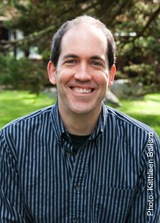
Advancement Board Chair Report:
The Most Important Question
Kevin Schofield
Whenever I get the chance to visit Friday Harbor Laboratories, I leave energized. There is so much important work happening, and the opportunity to see it firsthand and talk to the people making it happen is a genuine thrill. It re-emphasizes for me what makes the Labs such a unique place: even beyond the diversity of marine life and the availability of the right facilities and equipment – both critical components of research and education here – there are the amazing students, faculty and staff that keep the place humming with activity (Figure 1).
Being an inquisitive and science-minded sort of person, I ask a lot of questions when I’m visiting people at the Labs. Since I don’t have a background in marine science, my head is usually ready to explode by the time I’m done and I’m very appreciative of the patience that people show in answering my questions as I attempt to learn about their work. Without a doubt I now understand far more about biological processes, marine environments, and cell dynamics than I ever expected to, even though I also recognize that I’m barely scratching the surface of what the FHL researchers investigate. But through this learning process, I’ve also come to appreciate the importance of asking one question in particular:
 Figure 1. Sally Chang (right), a Ph.D. student from Kansas University, shares her passion for marine invertebrates with an FHL visitor. Sally is a 2014 Adopt-a-Student recipient who came all the way from the mid-west. She attended the Marine Invertebrate Zoology course and was thrilled to collect her specimens at sea on the R/V Centennial, an experience unique to the Labs. Photo credit: Rachel Anderson.
Figure 1. Sally Chang (right), a Ph.D. student from Kansas University, shares her passion for marine invertebrates with an FHL visitor. Sally is a 2014 Adopt-a-Student recipient who came all the way from the mid-west. She attended the Marine Invertebrate Zoology course and was thrilled to collect her specimens at sea on the R/V Centennial, an experience unique to the Labs. Photo credit: Rachel Anderson.
“What can I do to help?”
Much of the work done at Friday Harbor Labs could only be done here, or at perhaps one or two other labs in the world. The needs of that kind of work are often very special, and even UW -- with its tremendous infrastructure and resources as a world-class research university -- doesn’t readily have what is needed for some specific projects. Sometimes the needs are big, such as acquiring an electron microscope. Sometimes all that’s needed is $100 to fund a dive trip to collect samples. And you’d be surprised at how often the help that’s needed doesn’t require money; in this age of citizen science, that will only become more common. For example, there is currently a study on sea star wasting disease led by Dr. D. Harvell of Cornell University, a regular investigator at FHL, which uses volunteer citizen scientists to great effect in the collection of data on sea star infection rates along the West Coast. Other volunteer opportunities take forms such as helping with K-12 outreach in the local community, or even lending a hand on the research vessel Centennial from time to time.
I encourage you to learn more about the fantastic research and education work being done at Friday Harbor Labs – and when you do, please ask how you can help. I think you’ll be pleasantly surprised at the difference you can make.
One last note: I would like to personally congratulate Dr. Billie Swalla on her appointment as the new permanent Director of Friday Harbor Labs, and I look forward to continuing to support her as she settles into the role and works to move the Labs forward. This is an exciting time for marine science at the University of Washington, and Billie will do a fantastic job in guiding FHL over the coming years.



